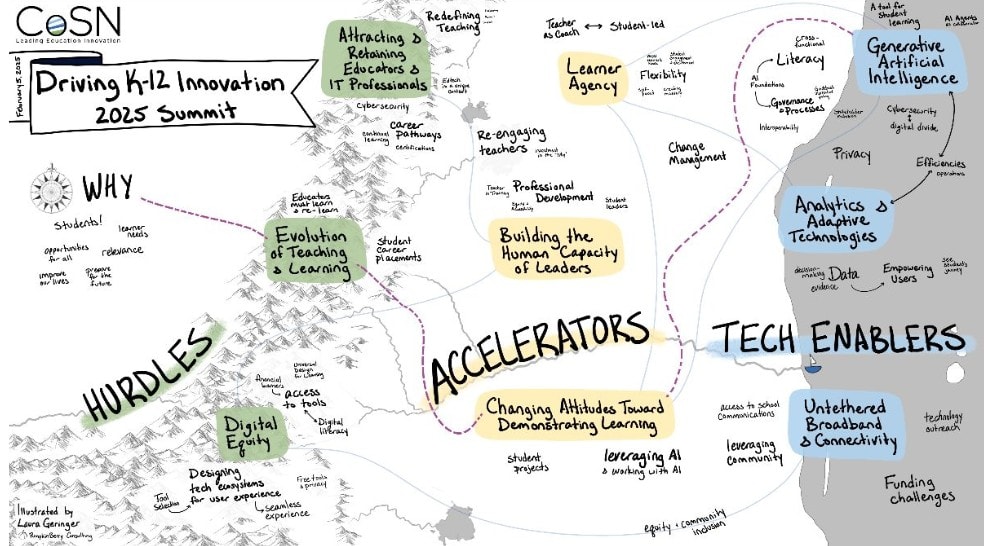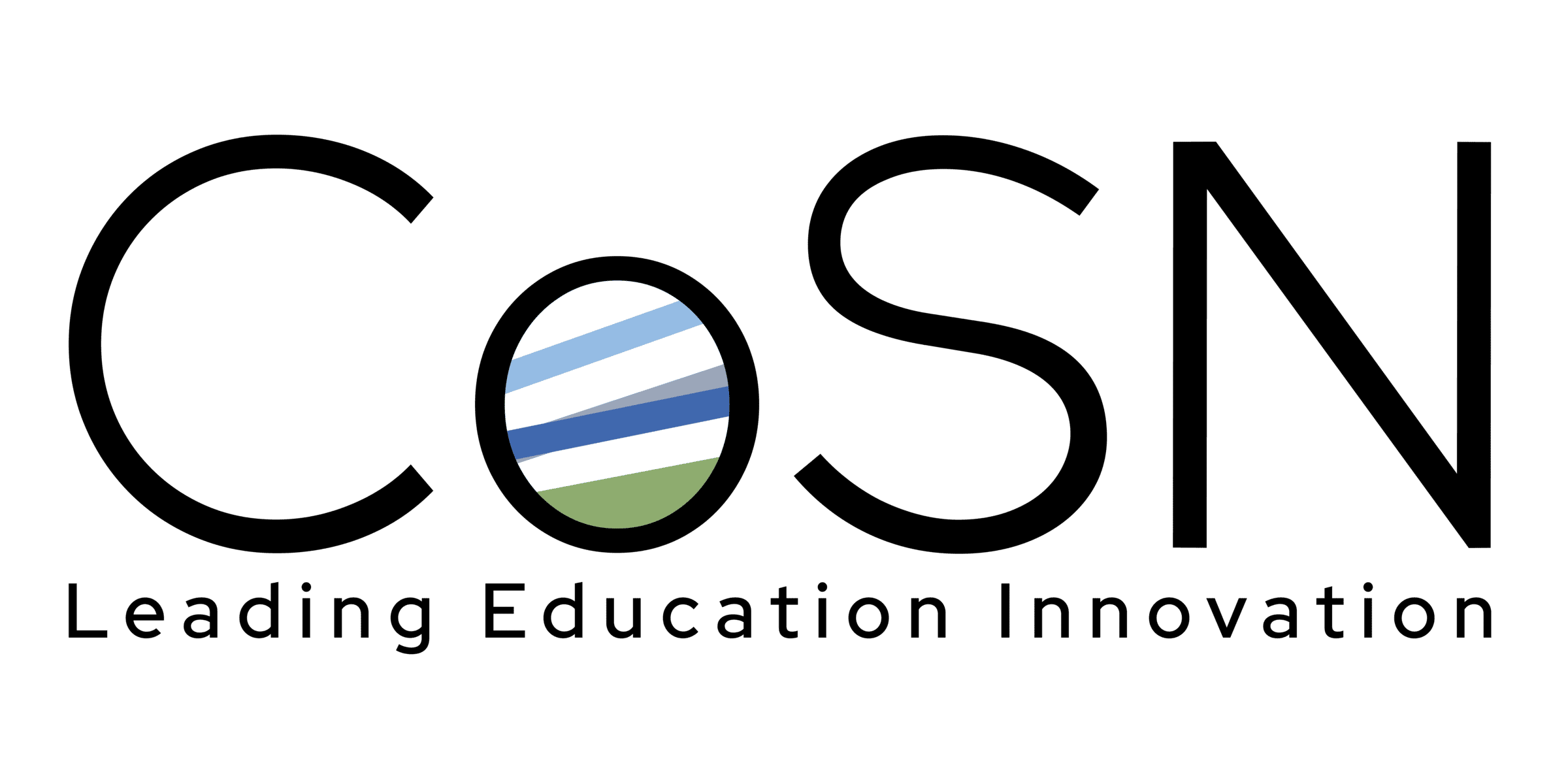On Wednesday, February 5, more than 100 global K-12 educators and technologists gathered for a dynamic two-hour virtual summit hosted by CoSN’s Driving K-12 Innovation Advisory Board. Designed as an interactive, “choose your own adventure” experience, the free event empowered participants to explore the biggest Hurdles (barriers), Accelerators (mega-trends or catalysts), and Tech Enablers (tools) advancing the future of education in 2025.
The Summit also celebrated the release of the Advisory Board’s annual 2025 Driving K-12 Innovation Report, sparking insightful discussions on the most pressing challenges and opportunities in the field today. Through engaging activities and polling, expert Ad Board panels, and real-world case studies, attendees gained insights on how to navigate roadblocks, leverage emerging trends, and integrate technology tools into their districts.
CoSN CEO Keith Krueger helped set the stage for the 2025 Summit, talking about how the work of the Ad Board isn’t to tell you what the future holds. “When we think about innovation, we need to be thinking about what we’re trying to solve today. It’s not about prediction, but rather invention — how do we create the future we want,” said Krueger. “Today what we want to do is reflect on what the hurdles are — the things we’re trying to overcome. What are the enablers that happen and what is the technology that will solve the big problems of today.”
During the Summit, select Ad Board members served on three unique panels to discuss the project’s 2025 Top Topics. Panelists included:
Hurdles
- Zainab Adeel, Bayaan Academy, Maryland, United States
- Edward McKaveney, Technology Director, Hampton Township School District, Pennsylvania, United States
Accelerators
- Ryan Cox, Director of Technology, Osseo Area Schools, Minnesota, United States
- Sarah Radcliffe, Director of Future Ready Learning, School District of Altoona, Wisconsin, United States
- Chris Smith, Instructional Designer, North Carolina Virtual Public School (NCVPS), North Carolina, United States
Tech Enablers
- Lisa Gustinelli, Director Instructional Technology, St. Vincent Ferrer School, Florida, United States
- Lorne Rodriguez, Manager of Enterprise GenAI, Chicago Public Schools, Illinois, United States
- Tom Ryan, Co-Founder, K12 Strategic Technology Advisory Group, New Mexico, United States
The panel conversations explored this year’s Top Topics, including the evolving landscape of K-12 EdTech, leadership development, the need for community, and AI integration. During the Hurdles panel, Adeel noted that, post-pandemic, schools continue leveraging digital tools, though interoperability and IT staffing remain challenges. McKaveney emphasized the need for career pathways and professional development to attract and retain educators and IT professionals, while also addressing critical media literacy and workforce readiness.
During the Accelerators discussion, Smith highlighted Learner Agency and Building the Human Capacity of Leaders, noting how internal training programs and digital equity initiatives can combat burnout and enhance education quality. Cox reinforced the importance of student-driven learning, where technology enables students to move at their own pace while teachers act as coaches rather than taskmasters.
While discussing Tech Enablers, Rodriguez shared Chicago Public Schools’ strategy for data governance and AI integration. Gustinelli emphasized connectivity challenges, particularly for low-income students, and the uncertain future of programs like the Affordable Connectivity Program.
Generative AI – another one of the Top Topics for 2025 – was also a key focus of the Tech Enablers conversation. Rodriguez spoke about efforts to build AI governance and literacy through steering committees, guidebooks, and professional learning networks. The discussion reinforced the need for strong leadership, adaptive technology, and equitable access to ensure EdTech remains a force for innovation rather than a barrier to learning.
Choose Your Own Adventure
After panelists discussed this year’s Top Topics, participants had the choice to decide how they wanted to spend the next half of their Summit. They could:
- Join breakout rooms to connect with fellow EdTech changemakers to discuss the topics most relevant to them right now and explore powerful combinations of topics
- Stay in the main Zoom Room with special guests from CoSN’s EdTech Innovation Committee who joined the Summit to share insights on the Summit and key topic intersections, like Attracting and Retaining Educators & IT Professionals and Building the Human Capacity of Leaders. Facilitators included:
-
- Emily Marshall, Work-based Learning Systems and Apprenticeship Program Manager, Pima Community College, Tucson, Arizona, United States (EdTech Committee Co-chair)
- Andy Fekete, Director for Innovation and Technology, Community Consolidated School District #93, Illinois, United States
- Katie Harmon, Director of Educational Technology, Westhill CSD, New York, United States
During their discussion, Marshall, Fekete, and Harmon reflected on key takeaways from the Summit, highlighting the power of community, leadership, and mindset shifts in education technology.
Harmon shared how the polling results shared throughout the Summit validated her thinking and reassured her that she wasn’t alone in facing challenges. Fekete emphasized that while tough decisions are inevitable, dialogue and collaboration — especially among under-resourced tech staff — are crucial for growth.
They discussed the importance of peer support networks, with Marshall noting that monthly CEO and CTO chats had significantly shaped her career. Fekete also stressed that creating a culture of sharing is vital, as many educators and tech leaders lack built-in support structures.
The conversation then shifted to Accelerators in education, such as Learner Agency and Building the Human Capacity of Leaders, especially related to Attracting and Retaining Educators and IT Professionals. Harmon described how embracing these ideas transformed her classroom culture, while Marshall and Fekete underscored the role of strong leadership in fostering sustainable change. Ultimately, they agreed that empowering EdTech leaders is key to driving innovation and easing burnout across districts. “In what ways are we going to develop and empower our leaders and our educators to really do what’s best for students,” asked Fekete.

Summit Resources to Help Spark Innovation
- Watch the full recording of the 2025 Driving K-12 Innovation Summit
- Summit co-host Laura Geringer (PumpkinBerry Consulting) synthesized our conversation and stories with her graphic facilitation! Download her summary
- Download the free report: Driving K-12 Innovation: 2025 Hurdles, Accelerators, and Tech Enablers
Special Thanks
CoSN would also like to thank everyone who helped make the Report and Summit possible, including our Sponsors (ClassDojo, CDW Education, Palo Alto Networks, T-Mobile for Education); Supporting Organizations; Advisory Board; Laura Geringer, Project Director, Graphic Facilitator, and Graphic Designer (PumpkinBerry Consulting); Stephanie King, Writer and Communications Manager; and James Evans, Graphic Designer.
AUTHOR: Stephanie King, Writer and Communications Manager,
CoSN’s EdTech Innovations Committee and Driving K-12 Innovation
Published on: February 5th, 2025
CoSN is vendor neutral and does not endorse products or services. Any mention of a specific solution is for contextual purposes.


